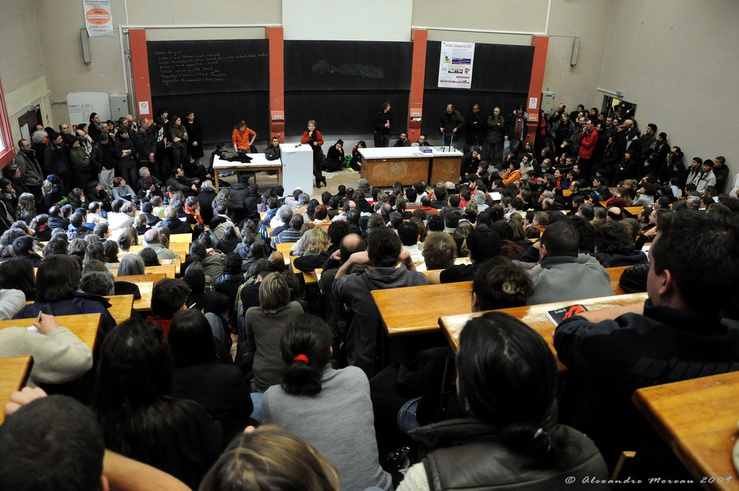
Bologna Process: French universities react
Published on
Translation by:
 bellaonbabel
bellaonbabel
At the end of 2008, Spanish, Italian and Greek universities showed their discontent. In 2009 it is France’s turn to denounce the consequences of the Bologna Process, which recommended a more hierarchical ‘management’ of universities. A professor explains why
'On 2 February, the university and research came to a halt.' Be they left-wing or right-wing, teaching and research professors (called 'prof de facs' in French) are on strike, and the student body has followed their example. The adminstrative staff are lending their support, and research technicians too have joined the fray. It took two sparks to light this powder-keg.

Firstly, the French government wants to drastically change the position of these teaching and research professors: a reform which comes as a consequence of the 'Law of rights and responsibilities of universities' (LRU). Passed and brought into force in 2008, this law places vast power in the hands of university presidents to the detriment of governing bodies. The former now have the mandate to reduce or to double teaching hours at will. Those who oppose the law are wary that it may lead to the wielding of arbitrary power as well as a loss of academic autonomy. Despite its name, this law has also increased centralised control by means of a new mode of financing which depends more heavily on businesses.
Teacher training, teacher precarity
The government has also declared a drastic training reform for primary and secondary school teachers: this will consist of five years of study as before, but the final year will no longer be a year of paid work experience (the students will have to rely on their own resources) and the recruitment exams will have less academic content. This is all, according to the government, a means of aligning with general European practice.
Projects will be largely state-fixed, prioritising potential industrial applications over pure theoretical research
Onto these reforms is grafted the planned dissolution of (amongst other institutions) the National Centre for Scientific Research (CNRS), which the government envisages dividing into multiple institutes on the pretext of transparency and, at the risk of heavyhanded state control, to better manage its training programmes. The financing of this institution has also drawn the anger of scientists. It will now be the responsibility of the National Research Agency (ANR, whose members are selected by the government), to distribute funding for research projects whose content will largely be fixed by the state. This will prioritise projects with potential industrial applications over pure theoretical research, and will also impose fixed-term contracts condemning employees up to the age of 40 with precarious job security. This is the French interpretation of European guidelines on collaboration between research and industry innovation.
Like the reorganisation of the university syllabus into the three levels of 'License' (degree), 'Masters' and 'Doctorate', which came into force in France in 2004, the LRU is the French interpretation of certain aspects of the Bologna Process recommending a more hierarchical organisation of universities. The question now: what will happen at the European conference on higher education and research, due to take place in Leuven, Belgium between 28 - 29 April?
Marie-Pierre Gaviano is conference co-ordinator at the University of Besançon and a member of the 'Sauvons la Recherche'association
Translated from Processus de Bologne : les universités françaises en colère


